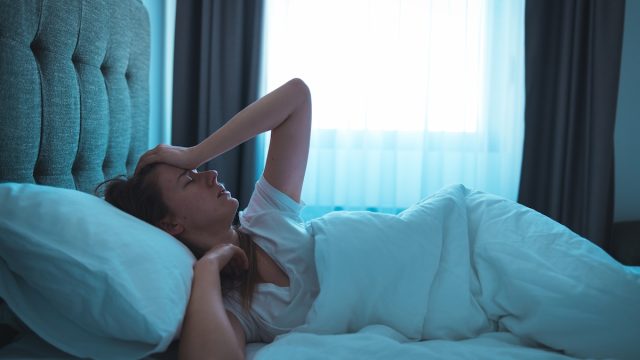Why You're Having Vivid Dreams This Month, New Research Shows
These are the most common dreams in October—and why you're having them.
The more vivid and lifelike your dreams are, the more significance they may seem to hold. However, if you've noticed that your dreams have taken a memorable turn in recent weeks, you're not alone. Experts say that in the fall, you may notice an uptick in these intense dreams—and the reason for them could surprise you. Read on to learn why you're suddenly having vivid dreams and what those dreams mean, according to new research.
RELATED: 6 Bedtime Routines That Will Help You Sleep Through the Night.
Changes in weather can affect your dreams.

Your dreaming patterns are subject to constant change, and the weather may have more of an effect on your sleep than you realize.
"When the seasons change, our internal body clocks must adapt to a new nightly routine," explains Martin Seeley, a sleep expert and the CEO of MattressNextDay. "As the days become shorter and darkness descends earlier, our melatonin production, the hormone responsible for sleep, increases. This adjustment can influence the frequency and vividness of our dreams."
RELATED: 5 Dreams You Should Never Ignore, According to Psychologists.
Your vivid dreams may taper off at daylight savings.

Many people find that after rolling back the clocks for daylight savings, they experience fewer vivid dreams. On Sunday, Nov. 5, we'll do just that—in theory, gaining an extra hour of sleep.
However, research has found that rather than delivering a longer, better night's rest, daylight savings often results in sleep disruptions that can last for over a week. This may mean reduced time spent in REM sleep, the phase in which dreams occur.
"During the following week [after daylight savings], many people wake up earlier, have more trouble falling asleep, and are more likely to wake up during the night," notes Harvard Health Publishing. "People who tend to be so-called short sleepers, logging under 7.5 hours a night, and early risers (also known as larks), have the most trouble adjusting to the new schedule."
Some dreams are especially common this time of year.

According to a recent study conducted by MattressNextDay, which analyzed over 279,000 dream-related Google searches, two types of dreams most commonly occur in October. These are dreams in which the person is naked and dreams about hair falling out.
Seeley says that while dream interpretation is often highly subjective, it may help you shed light on your current state of mind: "While October brings changes in sleep patterns and dream frequencies, it also presents an opportunity to explore the mysteries of our own minds."
Here's what it all means.

Inbal Honigman, a dream analyst and psychic reader who worked with the study's researchers, offered her own interpretation of the most common dream-related searches in October.
She says that a dream about your hair falling out "often symbolizes concerns about aging, stress, or a feeling of losing control. It reflects inner thoughts and anxieties about physical appearance and self-image. The dream may serve as a mirror to your insecurities or concerns related to your self-esteem." Similarly, a dream about being naked may reflect fears of vulnerability or change.
So, as we head deeper into fall, get those dream journals out and start scribbling.
For more sleep news sent directly to your inbox, sign up for our daily newsletter.






















